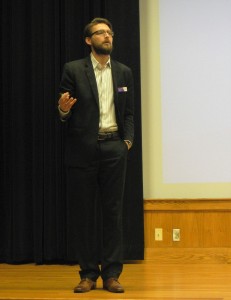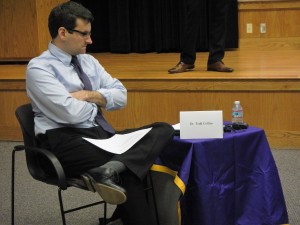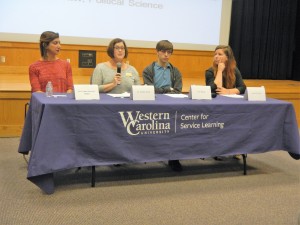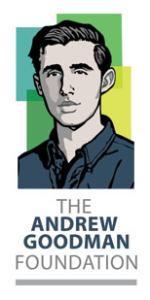On Thursday, March 3, WCU’s Center for Service Learning and The Andrew Goodman Foundation (AGF), with help from the American Association of State Colleges and Universities (AASCU) American Democracy Project, presented ‘Intentional Conversations’, a panel discussion designed to get students excited about voting in North Carolina’s upcoming March 15 primary.
“Change is slow, but the first effective step one can take is with his or her vote,” said Joanna Woodson, a Western Carolina University junior and AGF Fellow, as she addressed the crowd of just over 100 politically curious students.

Director of the Center for Service Learning, Lane Perry, introduces Intentional Conversations. Photo by Shelby LeQuire.
The hour-long panel discussion was held in the University Center theater from 5-6 p.m. Two professors and two students discussed their own personal ideas on some important issues coming up in the presidential race and local elections, like foreign policy and prison reform.
Jennifer Schiff, an assistant professor in the Political Science and Public Affairs Department, along with Dr. Cyndy Caravelis from the Criminal Justice Department, spoke out at the discussion.
Zack Daniels, a political science major and the president of WCU College Democrats, spoke to the crowd about gender equality and feminism. Woodson, a social work major and president of the Student Social Work Association, talked about voting rights.
Related Story: Student opinion on ‘Intentional Conversations’ panel
While the panel had four strong counterparts, two were missing. A third student, a representative from the College Republicans, was unable to attend the panel discussion, while a third professor had to cancel due to illness.
According to Woodson, who helped organize the event, coordinators wanted to create an unbiased, fair platform for student discussion on what political issues matter most to them.
Associate professor and director of Political Science and Public Affairs, Todd Collins, moderated the discussion panel on Thursday evening.

Todd Collins keeps track of the time while panelists talk. Photo by Shelby LeQuire.
“Voices matter and your vote is your voice,” Collins said, who kept time for the panelists and helped the discussion move along smoothly.
Caravelis, a former legislative analyst, began the political talk with an informative chat on social justice; prison reform in particular. She listed five reasons that prisons need to be reformed, in her opinion:
- “Prisons deprive liberty without a thought for rehabilitation.”
- “Imprisonment dis-proportionally affects the poor, and it’s not because poor people commit more crime.”
- “Any [health issues] we have in regular society is amplified in prison.”
- “Imprisonment disrupts families and weakens social cohesion.”
- “It costs $31,280 for one inmate to be imprisoned for a year.”
Caravelis said investing in education might make the difference in keeping people out of prison.
Schiff took the microphone next, highlighting some of the important factors of foreign policy in the current presidential race.
“The decisions we make [on foreign policy] effect every single one of the 7.1 billion people on the planet,” Schiff said.
Foreign policy encompasses many categories including trade, immigration, military action and diplomacy. Schiff took a few minutes to go over each one of the candidates’ individual views on the topic. Only Marco Rubio and Hilary Clinton have mapped out detailed foreign policy plans.
There might be some similarities concerning trade and military action between all of the candidates, but not a single one of them can agree on what to do about Syrian refugees, Schiff said.
Daniels transitioned the conversation from foreign policy to gender equality.
“When you hear someone say, ‘I’m a feminist’, you’re actually hearing them say, ‘I support equality’,” Daniels said.

Jennifer Schiff informs students on foreign policy. Photo by Shelby LeQuire.
Daniels used congress as an example to prove that men widely dominate in the American government, despite the population of women being larger than men.
“Congress is made up of 90 percent men, and only 10 percent women,” Daniels said.
He said that this presidential race is legendary because Clinton is running. He thinks more women should be encouraged to run for office, and more people should be open to giving them their vote.
Woodson ended the panel by discussing voter rights. Woodson is an intern at the AGF, a nonpartisan affiliation that is dedicated to expanding civil engagement.

Andrew Goodman Foundation logo, via andrewgoodman.org
The majority of her speech discussed the strict voter ID laws. This is an issue because 300,000 people just in North Carolina are registered to vote and do not have a valid ID, according to Woodson.
She said IDs are sometimes hard to obtain, making the law less than desirable. Many hours and many hardships have resulted from wasted trips to the Division of Motor Vehicles (DMV), which is notorious for being slow and hard to deal with.
While some say that the voter ID law is purely common sense because of possible voter impersonation, Woodson argues that it is unnecessary. A study from News21 showed that from 2011-2014 only 31 impersonation cases out of 2,000 accused were confirmed.
The four panelists received lots of feedback from the crowd. The last 30 minutes of the discussion was reserved for questions, which included inquiries about prison sentencing, presidential stances on immigration and how much a vote really counts.
“The most meaningful part for me was the opportunity to address one student’s concerns about how meaningful her vote could actually be. That’s a core concern I’ve heard from so many young people,” Woodson said later.
Woodson ended the panel conversation by encouraging students to go vote for the bond referendum in the primary.
The Center for Service Learning’s main goal with this panel discussion was to generate voter motivation, and coordinators hope that students will be inspired by the debate and get out to vote in the March 15 primary.


